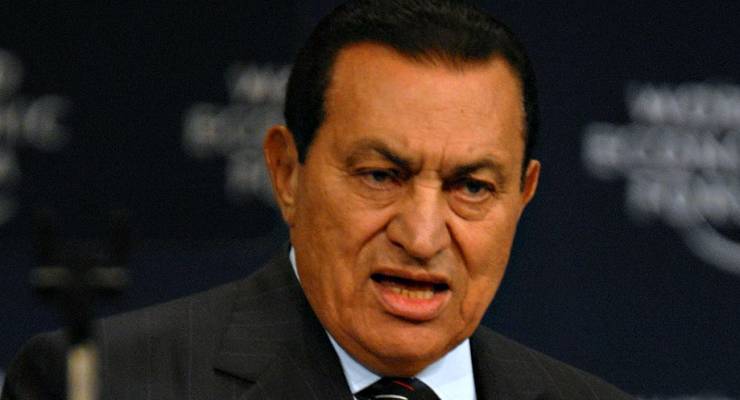
“Mr President, sir, it’s time to say goodbye to your people.”
“Oh,” says Mubarak, looking wistfully out the palace window, “where are they going?”
That’s an Egyptian joke for you. Rueful. Making the best of a dire situation. Not really all that funny — but sums up the reality that only death or a revolution would take out president Hosni Mubarak, who ruled the Arab world’s most populous nation for close to 30 years, mostly under emergency law which allowed him to do, well, anything really. The Pharaoh. Now death has taken him, at age 91. And it did indeed take a revolution to remove him.
Mubarak was the dictator’s dictator. The despot par excellence. From the military parades to the reflector sunglasses to the forever young hair — still jet-black at the age of 75. This was when I came within touching distance of the supreme ruler, as he pressed through a throng of adoring well-wishers, clustered around him at a Cairo factory where he had just spoken.
Make no bones about it: Mubarak was a shocking strong-arm ruler. He tortured, maimed and killed opponents — not by his own hand of course, but by Egypt’s feared internal security force.
Did I say he was feared? Add to that hated. Reviled. With a network of informers and sycophants he kept a population of 80 million souls under the thumb. Which perhaps explains why the streets around the factory had been totally cleared of any day-to-day life, replaced instead by police stationed an arm’s length from each other for a 1km-radius around the venue. Now that’s security.
Yet the Hosni Mubarak who stood before his audience on this day was just a great bloke. Funny. Charming. He shared a joke or two he’d had with friend and fellow dictator Muammar Gaddafi. The people lapped it up.
Mubarak’s 20-minute speech became a 40-minute love fest as supporter after supporter leapt to their feet to proclaim his greatness to His Greatness. So constant were the interruptions that eventually the president had to gently quell the adoration with a magisterial wave of the hand and a complicit laugh.
Let’s face it, though: if you weren’t seen to support the president — with your soul and your blood, as the proclamation goes — then you might as well pack it in now.
Heck, it’s little wonder Mubarak was returned with nearly 90% of the vote in, ahem, democratic elections which the United States warned would be, ahem, closely monitored.
When the election was done he would throw his opponent in prison. The unfortunate Ayman Nour had run against Mubarak with the encouragement of the US State Department, only to find himself abandoned by those who claimed they were bringing democracy to the Middle East (remember that one?).
Mubarak was considered the most powerful of the Arab dictators. He was in a perpetual state of internal war with the Muslim Brotherhood — who he branded “terrorists”. He was the “moderate” Arab leader who had successive US administrations on a string because he was able to “broker” a dialogue with Israel. He commanded eye-watering sums in military aid from the US every year, though no one did more to crush the idea of democracy or political dissent.
Mubarak showed this neophyte — me, as a resident of Egypt for two years — how to run propaganda and utterly destroy opposition voices. Egypt’s official newspaper ran daily tributes to the leader and distinguished itself by photoshopping Mubarak such that official photos had the US President hanging off his every word.
Mubarak routinely twisted reality. He painted conspiracies that didn’t exist. His people were raised on misinformation. They could not distinguish fact from fiction. They believed almost as one the myth — accepted region-wide — that the CIA carried out 9/11.
Under his rule the entire concept of truth was destroyed, paving the way for total manipulation. His population was exhausted from poverty and paralysed by fear. It was only when the internet came along and allowed his opponents to organise in secret that a revolution could be hatched and executed.
Call him an early adopter. Ahead of his time. But the dictator model of messing with people’s minds until they give up and shrug their shoulders has been catching on in the West.
We’ve got a way to go. There are functioning democratic institutions. An independent judiciary.
But here’s the moral of the story, if you don’t mind. What I learnt from being less than a metre away from the eternal ruler is that democracy is pretty darn fragile. It can fall apart and lapse into failed state cronyism before you can say “Hail, Mr President”.
So it pays to keep an eye on those good blokes who are loose with the truth, who have their tame media outlets and who simply hate accountability.








“They could not distinguish fact from fiction.”
Ha ja yeah, but we’re so smart, we’d never fall for that naive crap.
Ha ha ha.